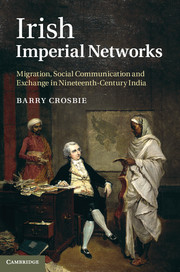Book contents
- Frontmatter
- Contents
- Preface
- Acknowledgements
- Abbreviations
- 1 Introduction
- 2 The business of empire
- 3 British overseas expansion, Ireland and the sinews of colonial power
- 4 From trade to dominion
- 5 Religion, civil society and imperial authority
- 6 From Company to Crown rule
- 7 Imperial crisis and the age of reform
- 8 Conclusion
- Glossary
- Bibliography
- Index
- References
1 - Introduction
Networks of empire – Ireland and India
Published online by Cambridge University Press: 05 December 2011
- Frontmatter
- Contents
- Preface
- Acknowledgements
- Abbreviations
- 1 Introduction
- 2 The business of empire
- 3 British overseas expansion, Ireland and the sinews of colonial power
- 4 From trade to dominion
- 5 Religion, civil society and imperial authority
- 6 From Company to Crown rule
- 7 Imperial crisis and the age of reform
- 8 Conclusion
- Glossary
- Bibliography
- Index
- References
Summary
Introduction
The narrow, atavistic and reactionary section of the Ireland of to-day will, doubtless, sneer at us ‘Shawneens’ and ‘West-Britons,’ but at the time we regarded ourselves as Irish Europeans, cosmopolitans and citizens of the world, who hoped to find in a liberalised and democratised British empire, in which Ireland occupied her worthy place, a metier in which we could live satisfying lives, and perhaps contribute a share, great or small, to human progress and human civilisation.
Patrick Heffernan, a former Irish member of the Indian Medical Service, made these comments in 1958, almost ten years after the Taoiseach, John A. Costello, had unexpectedly announced to a Canadian reporter that Ireland was to leave the British Commonwealth of Nations and become a republic. Heffernan, who had been brought up on the outskirts of Cahir, Co. Tipperary and had received a Catholic education in Cork and Dublin, held the conviction that Ireland and Irish people (irrespective of religious creed or class) had played significant roles in the wider British imperial system. At a time when Éamon de Valera and the Fianna Fáil party had just returned to power following the Irish General Election in 1957, Heffernan’s comments had a particular resonance. His sense that an Irish Catholic background was not incompatible with British imperial service, and therefore did not diminish his Irishness, was not uncommon, even during the heyday of Irish nationalism in the 1950s.
Heffernan’s ‘cosmopolitans and citizens of the world’ emerged from the distinct cultural, economic and political conditions of nineteenth-century Ireland, yet were joined together with their English, Scottish and Welsh colleagues within the British Empire, a legitimate arena for work where they could improve the material condition of their own lives as well as contribute to the welfare of others. As one astute Indian civil servant, A. G. Haggard, a Sub-Divisional Officer in Buxar, commented in the late nineteenth century:
The Irish members [of the Indian Civil Service] have mostly known each other in Ireland, the Scotch in Scotland and the English in England. During their long preparatory studies and their subsequent training the whole body have met (Irish, English and Scotch) time after time; they have formed intimacies and friendships; have worked, resided, and travelled together; have been united in a common end and occupation; have given material assistance and shared in mutual rivalries.
Like Heffernan, Haggard emphasises shared collaborative experiences, popular beliefs and cultural mentalities which have nevertheless become somewhat obscured within Irish historiography over the past fifty years.
- Type
- Chapter
- Information
- Irish Imperial NetworksMigration, Social Communication and Exchange in Nineteenth-Century India, pp. 1 - 23Publisher: Cambridge University PressPrint publication year: 2011



